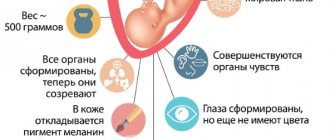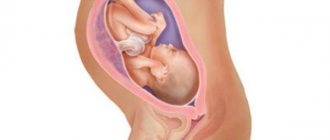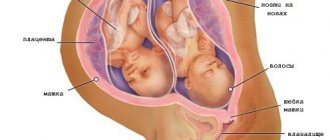Fetus at 33 weeks of gestation: movements, development, weight and size
The size of your belly is rapidly increasing. Now he weighs about 2 kilograms and has stretched up to 44 cm. There is less and less space in the tummy, and, starting from the 33rd week of pregnancy, it is almost impossible to roll over there. But the baby is so strong that mom feels the kicks in the ribs too well. Be patient, it will start to go down soon.
In the meantime, you can especially “vividly” from time to time feel how the baby knows how to “walk” along the ribs, periodically resting his legs on them or pounding the ribs from the inside. To relieve pain, try to find a comfortable position - perhaps the baby is simply uncomfortable. You can also resort to performing the “evil and good cat” exercise: when the back first arches and then bends. By the way, this exercise is very useful for the spine, and therefore is also included in the set of exercises for pregnant women.
Meanwhile, the maturation process continues. The work of the main systems of the body - the central nervous, endocrine, immune - is already well established. The alveoli are mature, the heart and blood vessels are growing and strengthening, as well as muscle mass, and the brain is developing.
The baby’s appearance is as close to perfect as possible - the proportions of body parts are equalized, and lanugo begins to disappear.
The baby has a well-developed sense of smell. Try not to use strong-smelling substances, eat and drink only healthy foods, and surround yourself with the cleanest air possible.
As for the intensity of the baby’s movements, keep in mind: it is different for each child, because each one also has his own disposition and temperament. In general, the number of movements should remain at the level of last month. Doctors call the generally accepted norm at least 10 movements within 2 hours. At the same time, every tangible movement of the baby is taken into account - pushes, kicks, blows, movements of the whole body. If after 2 hours you do not feel these same 10 movements, you feel a significantly smaller number of them, it is better to go for a consultation with a doctor.
Future mom
Monitor your health and weight gain. You need to try to prevent the development of gestosis, because in this case it becomes bad for both: both the mother and the fetus. Do not rush to deal with high blood pressure on your own. If you observe this sign in yourself, tell your doctor, since increased blood pressure during gestosis is a protective mechanism: this condition of yours becomes life-saving for the fetus.
Normal movements
Some expectant mothers are worried that their baby is not moving much, while others complain about too active movements. How to determine how much perceptible fetal movement there should be?
The simplest and most common way to determine the number of movements is called D. Pearson's test. It is used starting from the 28th week of pregnancy. To do this, they create a special table in which every tenth movement is noted in the period from 9.00 to 21.00. Normally, it is believed that the tenth movement should occur before 17.00. If the number of movements is less than 10 in 12 hours, you should inform your doctor, but if you do not feel any movements at all within 12 hours, you should immediately consult a doctor.
Those women who are worried that the baby is not moving much should know that he sleeps a lot in the womb, so he may not move at all for 2-3 hours in a row.
But sometimes, women’s fears may be justified; the child may really move little or, conversely, be extremely active. What is this connected with and how dangerous is it?
Discharge at 33 weeks of pregnancy
Do not stop monitoring any changes in discharge at 33 weeks of pregnancy. At this time, their character remains the same: the discharge is normally moderate, homogeneous, light or light milky in color, with a slight smell of sour milk.
The appearance of green, yellow, purulent discharge, curdled discharge or mixed with flakes is a sign indicating the development of an infectious disease of the genital tract. For a genital infection, the discharge often changes not only the color, but also the smell - it begins to smell sharp and unpleasant. In addition, a noticeable inflammatory process cannot be ruled out, causing significant discomfort: burning and itching, swelling of the genital organs. It is necessary to diagnose the pathogen and resort to adequate treatment in case of infection, otherwise there is a high risk of intrauterine infection of the fetus.
An extremely negative symptom is the appearance of spotting at 33 weeks. The appearance of blood is usually associated with placenta previa or placental abruption, both conditions pose a high risk for the further development of the fetus and the normal course of pregnancy. Therefore, even with a slight separation of blood, in the presence of spotting brown discharge, regardless of whether there is pain in the abdomen or not, you should immediately call an ambulance.
You should also seek medical attention if thin, watery discharge occurs. A larger than usual amount of discharge, and even liquid discharge, may indicate leakage of amniotic fluid. Remember that damage to the membranes, which is associated with the release of amniotic fluid, is not always accompanied by a one-time and simultaneous outpouring of amniotic fluid. Thus, amniotic fluid can leak in small portions; women who have encountered this phenomenon talk about a constantly haunting feeling of increased humidity in the perineal area. Even at the slightest sign of leakage, you should contact your doctor as soon as possible: if the membranes rupture, the infection can penetrate to the fetus within the first 24 hours.
Indications for caesarean section
Among the indications for caesarean section at the 33rd week of pregnancy are:
- severe intrauterine condition of the fetus;
- Rhesus conflict;
- placental abruption;
- acute fetal hypoxia;
- concomitant diseases of the mother in the stage of decompensation;
- transverse or breech presentation of the fetus;
- anatomically narrow pelvis;
- malignant neoplasms in women.
Indications for a cesarean section are determined individually for each patient. At the same time, the condition of the woman and child is at the core.
Fetal development
Growing and gaining weight is the main task for the fetus. Many organs and systems are already fully functioning:
- The heart has been pumping blood for several months now and makes 120-160 beats per minute.
- The baby swallows amniotic fluid, and the kidneys convert it into urine and excrete it from the body.
- The endocrine glands produce various hormones that, after childbirth, will regulate the child’s vital processes.
- The brain “commands” every movement of the fetus. Any of them is reflexive. The baby will gradually learn to control his muscles over the course of several years after birth.
The layer of subcutaneous fat continues to thicken, and the original fluff throughout the body disappears. The hair on the head thickens a little, but it is still soft and fluffy.
Some organs are not yet involved. The baby's lungs are at rest. But the diaphragm rises and falls, this is also training. There is nothing for the baby to look at in the womb; it is dark there, but the muscles of the eyes and eyelids are already ready for their activities.
Some babies weigh more than two kilograms at the thirty-third week. The weight norm is not violated, because newborns also have different parameters. Twins are probably not as tall and lighter in weight. Everything here is individual. On average, the fetus gains 15-25 grams of weight every day.
Well-being and sensations of the mother
Many women at 33 weeks admit that pregnancy has become quite a common condition. If there are no complications, then some of the inconveniences of the condition are compensated by emotional peace, the opportunity not to go to work/school, and the joy of waiting.
You may experience heartburn or constipation any day. If you do not yet know how to cope with these conditions, read about it in the “Recommendations” section at the end of the article.
At this time, you may discover that you have carpal tunnel syndrome, even if you have not typed on the keyboard for a long time. You may have external and/or internal swelling. Unwanted fluid accumulations interfere with the full movement of blood through the vessels, hence numbness and pain. Shake your hands more often, arrange them comfortably in your sleep, do not keep them down for a long time. An elastic bandage on the wrist or special orthopedic bandages will also help.
Periodic swelling in the legs appears after walking or standing for a long time. For the same reason, dilated blood vessels may appear that are visible under the skin.
Attention. Persistent swelling (appears constantly and does not go away for a long time) is a much more dangerous condition, as is a sudden weight gain of more than 300-500 grams per week. This may indicate late toxicosis, especially if you have high blood pressure. Read about this complication of pregnancy in the article on toxicosis.
Premature birth
In a normal pregnancy, babies should be born on time or just a little earlier. If the baby is born now, he will need a special incubator and professional medical care.
In multiple pregnancies, children are often born much earlier than the fortieth week. If you are expecting twins or even triplets, be prepared for this.
Caution: fatty acids
Typically, pregnant women are strongly advised not to eat high-fat foods. But omega-3 fatty acid is a very valuable element of fetal nutrition. This natural chemical compound is responsible for the development of the so-called cognitive abilities of the child. They include thinking, attention, memory, imagination and comprehension. Even in the first weeks of pregnancy, you may have often heard advice to include fatty fish in your diet. They contain acid that is so important. In late pregnancy, their importance increases several times.
What if you absolutely don't like fish or are allergic to seafood? Variations are possible. Your diet should include eggs, almonds, and walnuts. Flaxseed oil will also work. There is no need to pour it into a spoon and forcefully drink it, like a nasty medicine. Season your salad with it, especially if it is made from grated carrots.
Discharge and pain
Nothing changes here. Light, scanty vaginal mucus (transparent or white) is normal. An admixture of pus, a cheesy consistency, and an unpleasant odor signal pathological processes in the genitourinary system. Treatment is prescribed only by a doctor.
Abundant watery discharge is especially dangerous - cracks, even ruptures of the amniotic sac are possible. Blood or actual bleeding is another dangerous sign. Call an ambulance, as you may give birth prematurely.
Normally, nothing should hurt you. Unpleasant sensations of tension, heaviness, tightness in the abdomen, back, ribs and lower back are common physiological manifestations of pregnancy. But if something really hurts, be sure to notify your doctor, and if the pain is intense, seek emergency help.
What is placental abruption?
This is a rare but dangerous complication of the third trimester of pregnancy. Such cases are only 1-1.5%, but it is necessary to know about them.
The placenta normally begins to separate from the wall of the uterus during the last stage of labor, when the baby has already been born. If detachment occurs earlier, this is a pathology. Main symptoms:
- severe abdominal pain;
- vaginal bleeding;
- change in the shape of the abdomen - this happens due to the accumulation of blood secretions inside.
If the placenta has detached partially and in a small part, the mother still has a chance to carry the pregnancy to term. With significant or complete separation, the child is in danger of death. The fetus simply stops receiving enough oxygen through the placenta and umbilical cord and dies from suffocation.
If you notice the listed symptoms, immediately call an ambulance. It is possible that doctors will be forced to induce labor or even perform a caesarean section to save your baby's life.
Video: Possible complications
Prenatal clinic visit calendar
Typically, pregnant women see a doctor once every two weeks. A couple of days before the visit, you need to take blood and urine tests for several indicators; the doctor always writes out directions at the previous visit.
If for some reason you were not fully examined - you missed a scheduled ultrasound or tests, they may be scheduled this week. During an ultrasound examination, the doctor will check various physical indicators of the fetus (circumference of the head, chest, abdomen, symmetry of the length of the limbs). And also - the condition of the placenta and the amount of amniotic fluid.
As additional examinations, you may be recommended to undergo cardiotocography and Doppler ultrasound.
Photos of bellies
Deviations from the norm
First of all, it should be noted that active movements decrease significantly after 32-33 weeks of pregnancy. This is due to the fact that the child is already quite large and has little space to make movements.
The fetus moves less in the following cases:
- During physical activity of a woman. When the mother walks and does physical work, the baby in her womb lulls and becomes quiet.
- If a woman sits in one position for a long time.
- When the mother is worried and worried.
However, in some cases, the child’s quieting is associated with a pathology such as hypoxia (lack of oxygen). It can develop as a result of many reasons. Therefore, if a woman notices that the baby does not move for a long time during pregnancy, she should urgently contact a medical facility.
Extremely active movements of the baby in the womb may indicate an uncomfortable position for him. This happens, for example, when a woman lies on her back for a long time. At the same time, the large vessels of the uterus are compressed, and blood flow to the baby slows down. You just need to change your body position and the child will calm down.
Some women note a violent reaction from their child after they eat something sweet. As a result, he receives an influx of energy and releases it in this way.
Sometimes the reason for active fetal movements is completely banal - the nature of the unborn child. According to the observations of many parents, children who are active in the womb become just as active in their earthly life. This is especially evident at night, when the mother wants to sleep, and the child periodically wakes up and makes movements.
The 34th week of pregnancy has arrived and the baby’s movements are becoming very strong and noticeable.
How quickly time flies - just a little more and your baby will be born.
Recommendations
- Stick to your normal diet, plus recommendations to increase the amount of fatty acids in your diet.
- Do not drink tea or coffee with your meals; these drinks reduce the absorption of dietary iron.
- If you suffer from heartburn, drink jelly and don’t forget about porridge.
- To avoid shortness of breath, move slowly and allow plenty of time for any hikes and trips. Do not under any circumstances give up physical activity, otherwise unpleasant symptoms will increase.
- For constipation, the diet must include prunes, which perfectly stimulate contractions of the intestinal muscles.
- If your doctor has determined that you may be starting or are already developing hemorrhoids, practice regular rinsing with warm water.
- Eliminate cramps in the calf muscles with a calf massage. It is also recommended to pull the toes that are cramping towards you.
- Carefully care for the skin of the abdomen, buttocks, thighs and chest. Use any cream or lotion that is designed to combat stretch marks. This is especially important if the skin of your abdomen itches every now and then.
- If there is significant colostrum discharge, be sure to use bra pads and change them regularly, otherwise inflammatory processes may develop in a humid environment.
- Oligohydramnios, expecting twins, low placenta and the threat of premature birth are contraindications for intimate life. In all other cases, discreet sex is permitted.
- If you have fears about childbirth, visit a psychologist, tell your doctor about your fears, or just talk to your friends, ask for their advice and support.
- In later stages, the nasal mucosa often swells without signs of a cold (rhinitis during pregnancy). Do not use vasoconstrictor drops. Moisturize the nasal mucosa more often and maintain good humidity at home.
How is the baby developing at 33 weeks of pregnancy?
The weight of the fetus this week is about 2 kg, and its height is 44-45 cm.
The baby continues to build muscle mass and subcutaneous fat. The walls of the blood vessels are strengthened, the muscle mass of the heart increases, and the fetal heart at this stage becomes the same as that of a newborn child, with the exception of a small hole separating the atria. This is the so-called oval window, which closes with the baby’s first breaths after birth.
In the baby’s brain, the formation of nerve centers and connections between neurons continues.
The baby’s liver begins to divide into lobules, the blood circulation of each lobule is improved with the help of a clear arrangement of rows of liver cells. The sebaceous glands produce more and more cheese-like lubricant, which during childbirth will facilitate the passage of the baby through the birth canal.
The baby is no longer able to constantly change his position, therefore, taking the most comfortable position for himself, he pushes and kicks his mother in the ribs.
Survey
From the 30th week of pregnancy, a woman visits a gynecologist once every 7-10 days, depending on the concomitant pathology and the presence of complaints. Carrying out CTG is mandatory.
At 32–34 weeks of gestation, an ultrasound is performed, which is necessary to clarify the condition of the fetus.
Ultrasound
At 33 weeks of gestation, a third ultrasound screening is performed, which determines the following indicators:
- fetal dimensions: biparietal size, abdominal circumference, femur length;
- child's location;
- umbilical cord entanglement;
- amount of amniotic fluid;
- condition and degree of maturity of the placenta;
- uteroplacental blood flow.
If there are no abnormalities, ultrasound is no longer performed.










